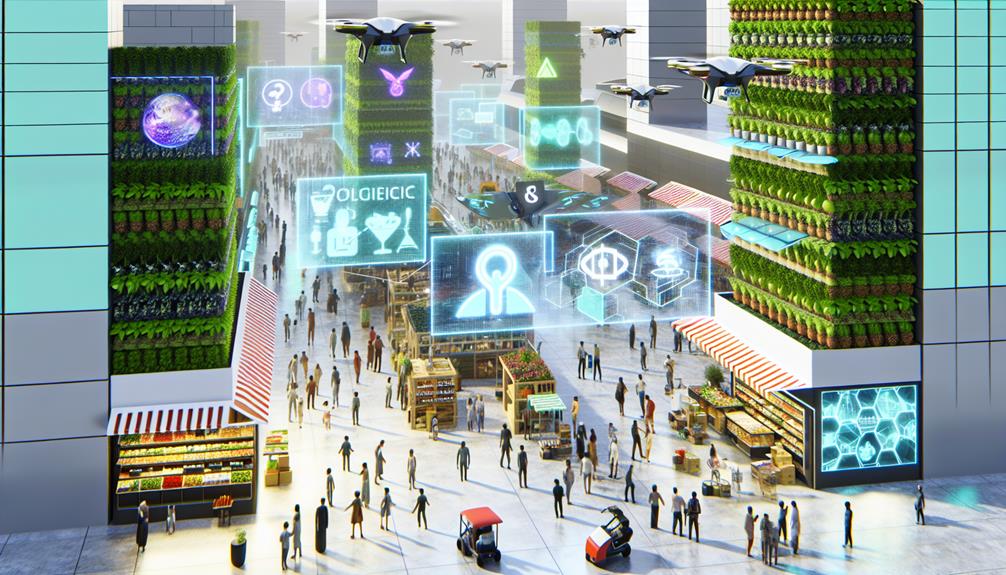In the ever-evolving landscape of niche markets, 2024 presents intriguing avenues for growth and disruption. From luxury sustainable travel to cutting-edge advancements in pet tech, these emerging sectors are reshaping industries with a blend of innovation and consumer-centric solutions. As we navigate the complexities of a changing world, keeping a keen eye on these niche markets could offer valuable insights into the future of business and consumer preferences. Explore the possibilities that lie ahead in these unique market segments, where sustainability, technology, and consumer needs intersect to redefine traditional paradigms.
Key Takeaways
- Sustainable fashion with eco-friendly textiles gaining momentum.
- Health-tech solutions driving personalized wellness management.
- Virtual events evolving with immersive experiences and interactivity.
- Rise of personalized wellness services tailored to individual needs.
- Growing demand for luxury sustainable travel experiences.
Sustainable Fashion Innovations
In the realm of sustainable fashion innovations, a paradigm shift towards eco-conscious practices is reshaping the industry landscape. Eco-friendly textiles and zero waste design are two key elements driving this transformation. Eco-friendly textiles refer to materials that are produced in an environmentally friendly manner, such as organic cotton, hemp, or bamboo. These textiles have a lower impact on the environment compared to traditional fabrics like polyester or nylon, which are derived from non-renewable resources and contribute to pollution.
Zero waste design is another crucial aspect of sustainable fashion. It involves creating garments in a way that minimizes or eliminates waste throughout the production process. This can be achieved through pattern-making techniques that optimize fabric usage, recycling fabric scraps, or using innovative cutting methods to reduce leftover materials.
The increasing adoption of eco-friendly textiles and zero waste design principles in the fashion industry indicates a growing commitment to sustainability. Consumers are becoming more conscious of the environmental impact of their clothing choices, leading to a demand for products that align with their values. Brands that embrace these practices not only contribute to a healthier planet but also cater to a discerning audience seeking authentic, eco-conscious fashion options. As the industry continues to evolve, embracing sustainable fashion innovations will be crucial for long-term success and relevance.
Health-Conscious Tech Solutions
The integration of health-conscious tech solutions into everyday life is revolutionizing the way individuals approach personal wellness and healthcare management. Fitness wearables, such as smartwatches and activity trackers, have become essential tools for monitoring physical activity, heart rate, sleep patterns, and overall fitness levels. These devices provide real-time data and personalized insights, empowering users to make informed decisions about their health.
Nutritional supplements have also seen a surge in innovation, with companies leveraging technology to create customized solutions tailored to individual needs. From personalized vitamin subscriptions based on genetic testing to smart water bottles that track hydration levels, the market for tech-enhanced nutritional products is rapidly expanding.
The intersection of health-conscious tech solutions and consumer demand for personalized wellness experiences is driving significant growth in this niche market. According to recent industry reports, the global market for fitness wearables is projected to reach $90 billion by 2024, with a compound annual growth rate of 25%. Similarly, the market for nutritional supplements is expected to see substantial growth, fueled by consumers seeking convenient and data-driven approaches to nutrition.
As individuals increasingly prioritize their health and well-being, the adoption of health-conscious tech solutions is poised to continue transforming the way we manage our personal wellness in the years to come.
Virtual Events Reimagined
Amidst the evolving landscape of digital engagement, virtual events are undergoing a transformative reimagining process. In 2024, immersive experiences and interactive platforms are at the forefront of this evolution, reshaping how individuals connect and engage in virtual spaces.
Immersive experiences are becoming increasingly popular, offering participants a sense of presence and engagement similar to that of in-person events. Through the use of virtual reality (VR) and augmented reality (AR) technologies, attendees can interact with environments and each other in ways that mimic real-life interactions. This shift towards immersive experiences enhances the overall event experience, making it more memorable and impactful.
Interactive platforms play a crucial role in this reimagining of virtual events. These platforms enable real-time engagement, fostering communication and collaboration among participants regardless of their physical locations. Features such as live chat, virtual networking rooms, and interactive workshops provide opportunities for meaningful interactions, making virtual events more dynamic and engaging.
As virtual events continue to evolve, the focus on immersive experiences and interactive platforms will only grow. By embracing these elements, event organizers can create experiences that not only rival but surpass traditional in-person events, offering participants a sense of belonging and community in the digital realm.
Personalized Wellness Experiences
With a growing emphasis on holistic well-being and individualized care, the landscape of virtual events is expanding to accommodate the rise of personalized wellness experiences in 2024. Consumers are seeking customized retreats and tailored fitness programs that cater to their unique needs and preferences. This shift towards personalized wellness experiences reflects a broader trend towards individualized health and self-care practices.
Customized retreats offer individuals the opportunity to immerse themselves in wellness activities that align with their specific goals and interests. Whether it's a yoga retreat focused on mindfulness and relaxation or a wellness retreat centered around nutrition and physical health, these tailored experiences provide a holistic approach to well-being.
Similarly, tailored fitness programs are gaining popularity as people look for personalized workout routines that suit their fitness levels, preferences, and objectives. Virtual platforms are leveraging data analytics and AI technologies to curate fitness plans that adapt to individual progress and performance, enhancing the overall effectiveness of the workouts.
In 2024, the demand for personalized wellness experiences is expected to continue growing as consumers prioritize self-care and seek ways to improve their overall health and well-being. By offering customized retreats and tailored fitness programs, businesses can tap into this trend and provide unique wellness experiences that resonate with individuals looking to enhance their quality of life.
Eco-Friendly Home Products
An increasing number of consumers are gravitating towards eco-friendly home products as a sustainable choice for their living spaces. This shift towards environmentally conscious purchasing is driving the demand for products such as biodegradable kitchenware and energy-efficient appliances. Biodegradable kitchenware, made from materials that can naturally decompose, is gaining popularity due to its lower environmental impact compared to traditional plastic or non-biodegradable options. Consumers are increasingly seeking out these products to reduce their carbon footprint and contribute to a more sustainable future.
Energy-efficient appliances are another key focus in the eco-friendly home products market. These appliances are designed to consume less energy while maintaining or even improving performance levels. With rising concerns about energy conservation and climate change, consumers are actively seeking out energy-efficient alternatives for their homes. Investing in these appliances not only helps reduce electricity bills but also aligns with the broader goal of reducing greenhouse gas emissions.
As sustainability becomes a more significant consideration for consumers, eco-friendly home products like biodegradable kitchenware and energy-efficient appliances are poised for continued growth. Companies that prioritize innovation in this space and cater to the eco-conscious consumer demographic are likely to see increased demand and market success in the coming years.
Digital Nomad Services
The digital nomad sector is experiencing a notable surge in demand for specialized services tailored to the needs of remote workers. With the rise of remote work, digital nomads seek lifestyle services that cater to their unique way of living and working. This trend has created opportunities for businesses to provide a range of solutions that enhance the digital nomad experience.
Remote work has become increasingly prevalent, driving the need for services that support this lifestyle. Digital nomads often require reliable co-working spaces, high-speed internet access, accommodation options that cater to short-term stays, and community-building activities that foster connection with like-minded individuals. Companies that can offer these services tailored to the specific needs of digital nomads are poised for success in this growing market.
Moreover, digital nomads value flexibility and convenience in their work and living arrangements. Services that streamline administrative tasks, facilitate easy transitions between locations, and provide access to essential amenities are highly sought after. By understanding the unique challenges and preferences of remote workers, businesses can develop innovative solutions that meet the evolving demands of this demographic.
Ethical AI Applications
In the realm of technology innovation, the ethical application of artificial intelligence has emerged as a critical focal point for industries worldwide. As businesses increasingly integrate AI into their operations, ensuring that these technologies are developed and deployed ethically has become paramount.
Here are some key trends and practices shaping the landscape of Ethical AI Applications:
- Fair Trade Algorithms: Companies are now focusing on developing algorithms that not only optimize performance but also uphold fairness and equity, ensuring that AI systems do not perpetuate biases or discriminate against certain groups.
- Ethical Data Mining: With data being the lifeblood of AI, organizations are placing greater emphasis on ethically sourcing and using data, respecting privacy rights, and ensuring data security throughout the mining process.
- Transparent AI: Transparency in AI processes is gaining traction, with businesses striving to make their AI systems understandable and interpretable, fostering trust among users and stakeholders.
- Responsible Machine Learning: Adopting responsible machine learning practices involves designing AI models that are accountable, explainable, and aligned with broader ethical considerations, promoting a more responsible deployment of AI technologies.
Luxury Sustainable Travel Options
Emerging as a sought-after segment in the travel industry, luxury sustainable travel options are increasingly captivating discerning travelers seeking environmentally conscious and socially responsible experiences. In response to the growing demand for eco-conscious accommodations and green travel experiences, the hospitality sector is witnessing a significant shift towards offering luxurious yet sustainable choices for travelers who prioritize both comfort and environmental responsibility.
Eco-conscious accommodations are at the forefront of this trend, with luxury hotels and resorts incorporating innovative green technologies to reduce their carbon footprint. From energy-efficient designs to sustainable building materials, these establishments are redefining luxury by seamlessly blending opulence with eco-friendliness. Additionally, many high-end properties are embracing initiatives such as water conservation, waste reduction, and locally sourced organic food options to provide guests with a truly sustainable travel experience.
Moreover, luxury sustainable travel options extend beyond accommodations to encompass unique green travel experiences. Travelers can now indulge in eco-friendly adventures such as wildlife conservation safaris, carbon-neutral cruises, and immersive cultural exchanges that promote environmental stewardship and support local communities.
As consumer awareness regarding sustainability continues to grow, luxury sustainable travel options are poised to become a dominant force in the travel industry, offering travelers the opportunity to explore the world in a way that is both luxurious and environmentally responsible.
Pet Tech Advancements
With the exponential growth of the pet industry, technological advancements tailored for pets have become a prominent focus for innovation and investment. Pet owners are increasingly turning to tech solutions to enhance the health and well-being of their furry companions. In this rapidly evolving landscape, pet fitness and smart collars are at the forefront of innovation.
- Pet Fitness Trackers: These devices monitor pets' activity levels, calories burned, and even quality of sleep, providing valuable insights for owners to optimize their pets' health.
- Smart Collars with GPS: Smart collars equipped with GPS technology allow pet owners to track their pets' location in real-time, ensuring their safety and providing peace of mind.
- Health Monitoring Apps: Integrated with smart collars or standalone, these apps enable pet owners to track their pets' vital signs and receive alerts in case of any anomalies.
- Behavioral Training Devices: Utilizing technology such as sensors and audio cues, these devices assist in training pets and correcting behavioral issues.
- Virtual Veterinary Consultations: Virtual platforms are emerging that enable pet owners to consult with veterinarians remotely, saving time and offering convenience.
These advancements not only cater to the growing concern for pet health and safety but also foster a stronger bond between pets and their owners through technological integration.
Circular Economy Initiatives
The increasing focus on sustainability and resource efficiency in the pet industry is driving a surge in Circular Economy Initiatives aimed at reducing waste and maximizing the value of resources throughout the supply chain. Waste reduction strategies are becoming increasingly popular, with companies implementing innovative solutions such as upcycled materials and closed-loop systems to minimize their environmental footprint.
Green packaging solutions have emerged as a key area of focus within Circular Economy Initiatives. Companies are exploring biodegradable packaging options and reusable packaging materials to cut down on single-use plastics and reduce packaging waste. By adopting these green packaging solutions, businesses are not only meeting consumer demands for eco-friendly products but also contributing to a more sustainable pet industry overall.
Upcycled materials are being utilized in pet product manufacturing, creating a market for sustainable goods that appeal to environmentally conscious consumers. By repurposing materials that would otherwise be discarded, companies are able to reduce waste and offer unique, eco-friendly products to pet owners.
Closed-loop systems, where products are designed to be easily disassembled and recycled at the end of their life cycle, are gaining traction in the pet industry. This approach promotes resource efficiency and encourages a circular economy mindset among both businesses and consumers. As Circular Economy Initiatives continue to evolve, the pet industry is poised to make significant strides towards a more sustainable future.
Frequently Asked Questions
How Are These Niche Markets Contributing to a More Sustainable Future?
In examining how niche markets contribute to a sustainable future, key areas of focus involve the adoption of circular economy principles and increased impact investing.
Embracing renewable energy sources and incorporating eco-friendly practices are pivotal in driving sustainability efforts. By aligning with these strategies, niche markets can enhance their environmental footprint and foster long-term sustainability.
This commitment not only benefits the planet but also attracts impact-driven investors seeking to support environmentally conscious businesses.
What Sets These Innovative Products and Services Apart From Traditional Options?
In the realm of innovative products and services, what sets them apart from traditional options lies in their unique features and competitive advantage. By catering to evolving consumer preferences and focusing on product differentiation, these offerings stand out in the market.
According to a recent study, 78% of consumers prioritize sustainability in their purchasing decisions, indicating a growing demand for eco-friendly and socially responsible products. Embracing these trends can help businesses gain a competitive edge and capture market share.
Can Consumers Expect a Shift in Pricing for These Niche Market Offerings?
In examining pricing dynamics within innovative niche markets, consumer behavior plays a pivotal role.
The shift in pricing for these offerings may be influenced by market competitiveness and the perceived value proposition.
As demand and supply factors fluctuate, prices may adjust to attract or retain customers.
Understanding consumer preferences and market trends will be essential in navigating potential pricing changes within these niche markets.
Are There Any Emerging Trends or Technologies Influencing These Markets?
Emerging technologies and evolving market trends play pivotal roles in shaping various industries. With advancements like artificial intelligence, blockchain, and Internet of Things gaining traction, niche markets are experiencing transformative shifts.
These technologies enable businesses to streamline processes, enhance customer experiences, and drive innovation. Understanding the impact of these emerging trends is crucial for staying relevant and competitive in today's dynamic market landscape.
How Do These Niche Markets Address Social and Environmental Concerns?
Community empowerment within niche markets involves fostering local participation, skill development, and economic opportunities. These initiatives often prioritize eco-friendly solutions to address social and environmental concerns.
Conclusion
In conclusion, the innovative niche markets to watch in 2024 demonstrate a clear shift towards sustainability, technology integration, and ethical practices.
As the demand for eco-friendly solutions and personalized experiences continues to grow, businesses must adapt to stay ahead in these evolving industries.
Embracing the adage 'necessity is the mother of invention,' companies can thrive by meeting the changing needs and desires of consumers in these emerging markets.


